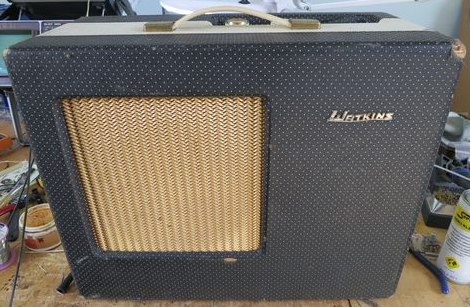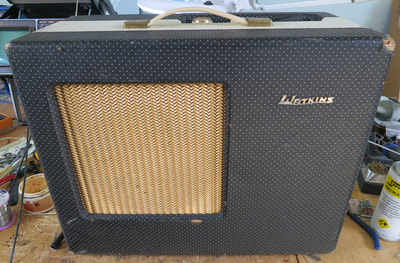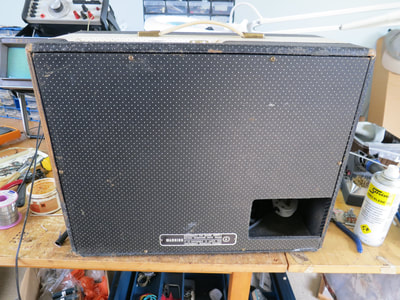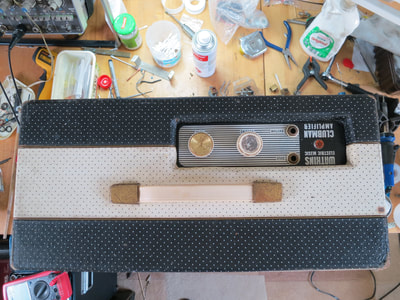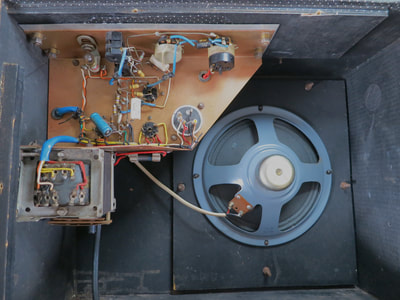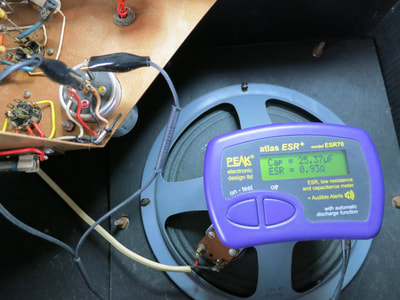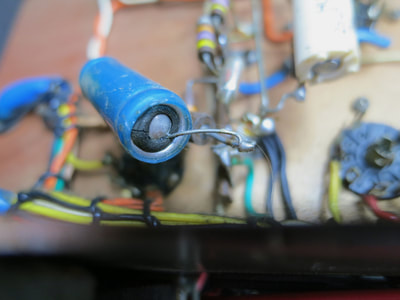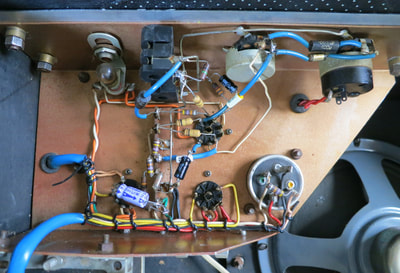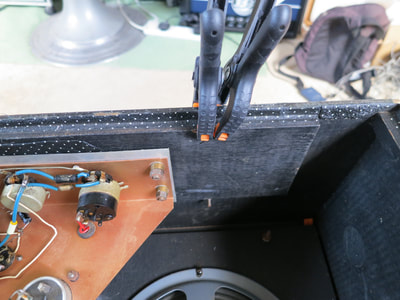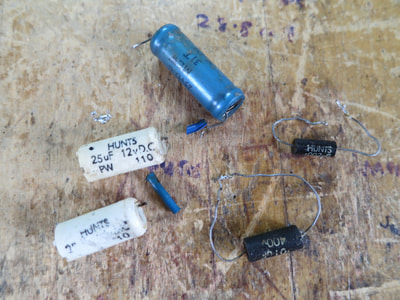Watkins Clubman
Here's a quick look at another little Watkins, this time it's a Clubman in black and cream. This little brother (or sister) of the Westminster worked pretty well but needed a quick service and checkup. The owner wondered if it could "do a bit more".....
The ESR meter can tell you when a capacitor is bad, but it can also tell you when bad caps appear to be good!! Confused? Look at the fourth picture below. Obviously a prime candidate for replacement, with cracked, bulging out of shape ends, but it still read ok on the meter! The main three section can capacitor read excellent too, and although the rubber looked a little perished, it wasnt bulging or leaking any juice and the amp was whisper quiet, so it was definitely doing its job. The amp was only going to be used occasionally for recording so the can was left in place.
A quick chat on the phone and I was just going to leave all alone for originality, except I didn't.
I always check coupling caps for leakage, especially here, as the black Hunts variety commonly fail.
Lo and behold two of them were leaking, one excessively, so they came out. The one between the pots didn't matter as DC blocking is done by the one in front of it, connected to the plate of an ECC83.
For good tone and maximum gain I replaced the white electrolytic cathode bypass caps too.
Now it's sounding quite a bit clearer with a tad more grunt. Just have to keep an eye on that old can cap now and then.
The ESR meter can tell you when a capacitor is bad, but it can also tell you when bad caps appear to be good!! Confused? Look at the fourth picture below. Obviously a prime candidate for replacement, with cracked, bulging out of shape ends, but it still read ok on the meter! The main three section can capacitor read excellent too, and although the rubber looked a little perished, it wasnt bulging or leaking any juice and the amp was whisper quiet, so it was definitely doing its job. The amp was only going to be used occasionally for recording so the can was left in place.
A quick chat on the phone and I was just going to leave all alone for originality, except I didn't.
I always check coupling caps for leakage, especially here, as the black Hunts variety commonly fail.
Lo and behold two of them were leaking, one excessively, so they came out. The one between the pots didn't matter as DC blocking is done by the one in front of it, connected to the plate of an ECC83.
For good tone and maximum gain I replaced the white electrolytic cathode bypass caps too.
Now it's sounding quite a bit clearer with a tad more grunt. Just have to keep an eye on that old can cap now and then.
Musicman RP 112 Sixty-five JMI Vox AC 10
Elpico AC52 Carlsbro CS 60
Filmosound Amplifiers Hiwatt Lead 50R
Lab Series L2 Burns
Lab Series L5 Fender Twin Reverb
Selmer Constellation 20 Fender Musicmaster Bass
Selmer Treble & Bass Mk 2 Impact 60
Schaller KV40 Northcourt 50
Fender 5F1 Champ RSC Bass Major
Traynor YGL 3 - Mark 3 Mystery Amp
Watkins Westminster Denco 912-Plus
Denco 912-Plus Interesting Waveforms
Wem Dominator Mk 3 Mullard 5-10
Wem Watkins Copicat Mk 3 Decca Amp
Elpico AC52 Carlsbro CS 60
Filmosound Amplifiers Hiwatt Lead 50R
Lab Series L2 Burns
Lab Series L5 Fender Twin Reverb
Selmer Constellation 20 Fender Musicmaster Bass
Selmer Treble & Bass Mk 2 Impact 60
Schaller KV40 Northcourt 50
Fender 5F1 Champ RSC Bass Major
Traynor YGL 3 - Mark 3 Mystery Amp
Watkins Westminster Denco 912-Plus
Denco 912-Plus Interesting Waveforms
Wem Dominator Mk 3 Mullard 5-10
Wem Watkins Copicat Mk 3 Decca Amp

